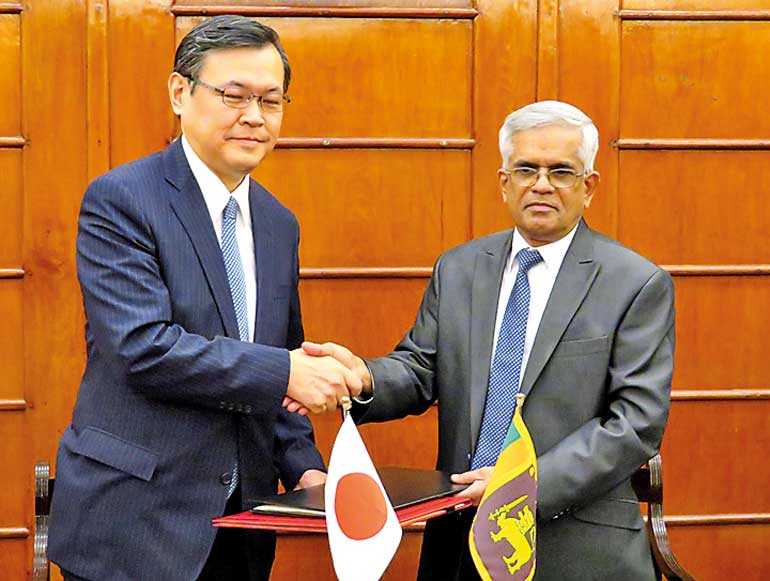Monday Feb 23, 2026
Monday Feb 23, 2026
Tuesday, 12 March 2019 00:57 - - {{hitsCtrl.values.hits}}

A concessionary loan agreement for JPY 30,040 million (approx. Rs. 48 billion) was signed yesterday between the Government of Sri Lanka and Japan International Cooperation Agency (JICA) for engineering services and construction of a Light Rail Transit (LRT) line between Malabe and Colombo Fort.
The loan will finance Sri Lanka’s first rail-based, electrified urban mass rapid transit line. It will serve to connect the Colombo’s commercial hub with the administrative capital, and significantly reduce travel time in the most congested transport corridor in the country, and the only major corridor currently not supported by railway. The Malabe-Fort LRT line has a total length of approximately 16 km, with 16 stations.
The stations are placed at frequently accessed locations and include Malabe – IT Park, Battaramulla, Rajagiriya, Cotta Road Railway Station and National Hospital up to current Fort/Pettah Railway Station. The entire rail track and stations will be on elevated viaducts to minimise requirement of land acquisition.
At peak travel times in the morning and evening, trains are planned to run every two to three minutes (headway). Each four-carriage train will have a passenger capacity of over 800, which could be increased by adding more carriages in future when necessary. With an 80km/h top speed, travel time from Malabe to Fort will be approximately 30 minutes (incl. stopping time at stations) with the LRT.
The Government of Sri Lanka has requested for the cost of infrastructure, rolling stock and engineering services to be financed through a series of time-slice loans from JICA, in line with the annual fund requirement for the project.
High quality Japanese technology would be used to establish Sri Lanka’s first urban electric light rail line. In order to promote technology transfer and economic cooperation between Sri Lanka and Japan, JICA’s loans for this Project are provided under Special Terms for Economic Partnership, with interest rates of 0.1% p.a. for civil works and equipment cost, 0.01% p.a. for engineering services cost and 40 year repayment period including 12 years’ grace period.
To facilitate inter-connectivity with other public transport modes, multi modal terminals are proposed at Malabe (together with bus terminal) and Cotta Road (connecting with railway). At Fort/Pettah the LRT line will connect to the planned Multi Modal Transport Hub accessible to both railway and bus.
Station facilities and LRT carriages will be designed to ensure accessibility to persons with disabilities, as well as passengers with small children and senior citizens.
The feasibility study including the Environmental Impact Assessment (EIA) for the Malabe-Fort LRT line was conducted with grant financing from JICA. The EIA has been approved by the Central Environmental Authority.
Although the elevated viaduct will minimise the requirement, some land acquisition is needed at the Depot and some of the Station locations. The Ministry of Megapolis and Western Development, the executing agency for the Project, will conduct such acquisition in accordance with the National Involuntary Resettlement Policy, and JICA’s environmental and social considerations guidelines to ensure inclusive development through public projects.
Since the railway tracks and stations are constructed at high elevation and over national roadways with high traffic volume, appropriate safety measures during construction are critical to ensure the safety of the construction personnel and the general public. JICA will continue to pay special attention to safety aspects in implementation of the project.
The loan agreement for the Malabe-Fort LRT was signed by Ministry of Finance Secretary Dr. R.H.S. Samaratunge and JICA Sri Lanka Office Chief Representative Fusato Tanaka, with the participation of the Ambassador of Japan to Sri Lanka, Secretary of the Ministry of Megapolis and Western Development and other officials of the GoSL side. The project is executed by the Ministry of Megapolis and Western Development.
JICA is the implementing agency for Official Development Assistance from the Government of Japan, and is one of the largest contributors to the transport sector in Sri Lanka. JICA financed 66km of the Southern Expressway and Kottawa to Kadawatha section of the Outer Circular Expressway. JICA is also currently financing the new bridge across the Kelani River at Peliyagoda which is planned to be completed in 2020.
“JICA is proud to be the partner of the Government of Sri Lanka (GoSL) in establishing the very first urban LRT line in Sri Lanka. It will fundamentally change the face of public transport in this country, ease traffic congestion and improve the environment of Colombo city. We hope, the GoSL will take sustainable measures to ensure proper operation and maintenance, so that the benefits of Japanese technology and concessionary funding could be enjoyed by the public of Sri Lanka,” said Tanaka.